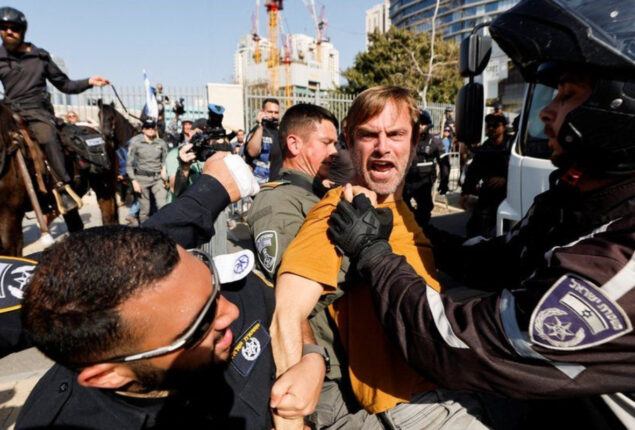Protests erupt across Israel as Netanyahu’s government introduces bills to weaken courts
Benjamin Netanyahu's cabinet introduced a contentious judiciary overhaul law. The reforms also...

Israel police crack down on protests against judicial reforms
In a “day of disruption,” Israelis are obstructing roads and railroads as a form of protest against divisive judicial reforms.
In Tel Aviv, police detained a protester while kneeling on his neck and using water cannons and stun grenades.
The demonstrators think that the significant changes being rammed through parliament will harm democracy and undermine judicial independence.
The government’s branches will once again be balanced, according to ministers.
The demonstrators have been referred to as “anarchists” by them.
Many altercations were captured on camera as police pulled protesters away in Tel Aviv. Some attempted barricade breaking was stopped by officers mounted on horses.
Speaking on Israeli Channel, one protester called Zeev commented: “This is terrible violence, no-one touched the policemen. We were in a protest of civil people. We didn’t expect such a thing. We are here to support democracy.”
However, the far-right National Security Minister, Itamar Ben-Gvir, said police had been “very patient” and had barriers and stones thrown at them.
He backed the measures being used, saying the force “must use all the means at its disposal to maintain public order and the daily routine of Israeli citizens”.
Prime Minister Benjamin Netanyahu wrote on Twitter: “The right to protest is not the right to anarchy.”
In parliament, which is in Jerusalem, members of the opposition boycotted a vote by the constitution, justice and law committee as it gave initial approval to more proposals in the judicial reforms plan.
Changes to the justice system are a cornerstone of the policy of Israel’s new nationalist-religious coalition led by Mr. Netanyahu.
They aim to give the elected government decisive influence over the choice of judges and limit the ability of the Supreme Court to rule against the executive or strike down legislation.
Critics say that this endangers the political system of checks and balances, given that Israel has no constitution and only one parliamentary chamber that is controlled by the ruling coalition.
Tens of thousands of people have turned out for weekly mass rallies against the new legislation in recent weeks.
On the congested major highway between Tel Aviv and Jerusalem on Thursday, demonstrators occasionally caused traffic to stop.
Israel’s blue and white flag was being waved by many. “Democracy” cries were raised, along with the slogans “Israel is not a dictatorship, Israel is not Hungary”—a country whose right-wing nationalist prime minister, Viktor Orban, has been charged with eroding democratic institutions, including the judiciary.
According to polls, most Israelis prefer a compromise over the government’s proposal and believe it to be unpopular.
The country is in danger of “constitutional and societal collapse,” according to President Isaac Herzog, who mostly plays a symbolic leadership role. He has urged government and opposition leaders to communicate with one another.
The new legislation has drawn criticism from a number of Israel’s friends abroad.
“Slow down a little a bit, maybe bring people together, try and build some consensus,” US ambassador to Israel Tom Nides said this week.
Unit 8200 veterans from an elite Israeli military intelligence unit have joined the growing number of army reservists who have threatened to boycott reserve duty in opposition.
“It’s completely unusual,” one reserve officer told the media. “We tend to remain impartial in these matters but it’s not a routine political debate. It’s a dramatic change. We are worried that our crucial principles of democracy will be completely ruined.”
High-tech employees, attorneys, and bankers have all expressed concern about the effects, particularly those on the economy.
Mr. Netanyahu, who is accused of corruption but denies it, claims the adjustments will increase business.
Catch all the World News, Breaking News Event and Latest News Updates on The BOL News
Download The BOL News App to get the Daily News Update & Follow us on Google News.